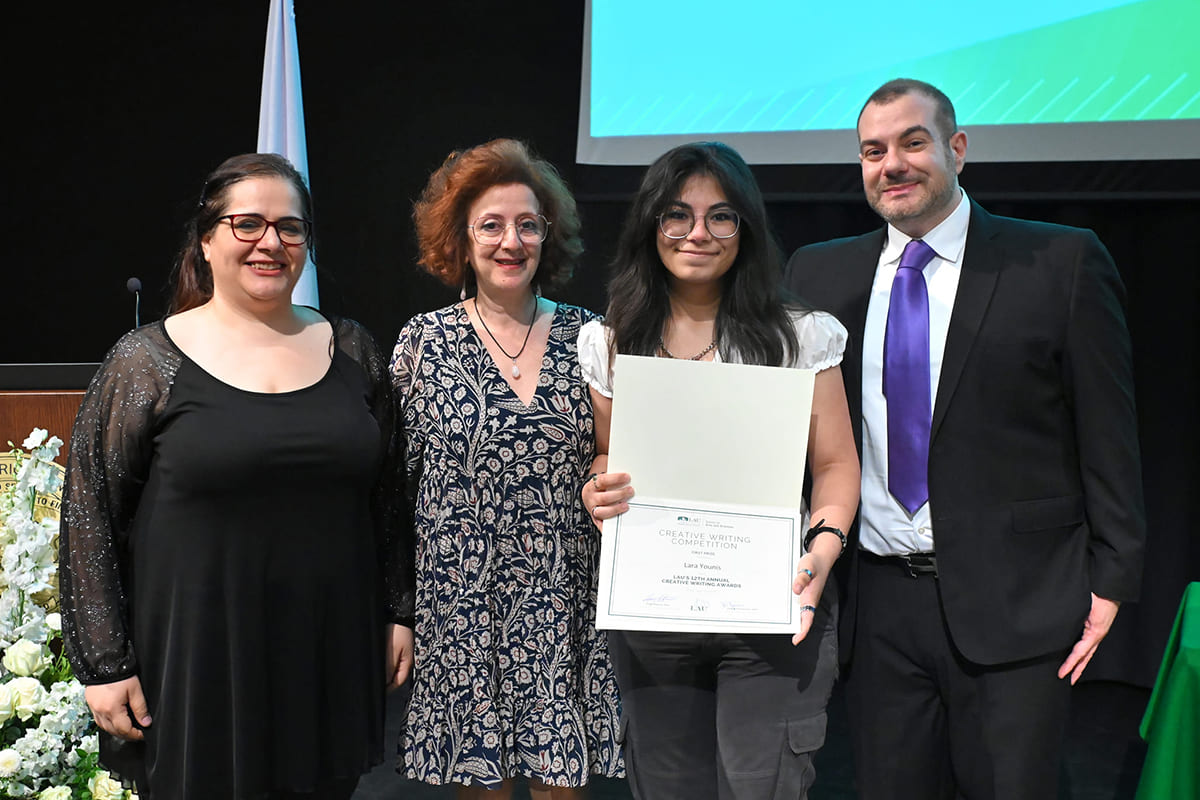Removing the Barriers to Inclusion Through Creative Writing
Students and alums share their reflections on diversity within and beyond the LAU classroom through the safe and engaging spaces of the 12th Annual Creative Writing Competition.
As a centennial initiative, the English program at the Department of Communication, Arts, and Languages dedicated its 12th edition of the Annual Creative Writing Competition to the enduring principles of diversity and inclusion that have guided the university since its establishment as the region’s first women’s college.
The awards ceremony, which took place on April 26, 2024, at the Gulbenkian Amphitheater on the Beirut campus, featured engaging personal narratives by current students and alums from various disciplines who reflected on their experience of diversity, equity and inclusion at LAU and beyond.
In a university environment, which mirrors our broader community, ensuring equal access to tools, resources, and safe spaces is crucial for fostering inclusivity and self-expression. Overcoming barriers related to race, ethnicity, physical abilities and educational background is essential for students to thrive, unlock their full potential and experience personal growth.
One way to break such barriers is through writing, which gives students “a third space where they can grow not only as writers but also as individuals in the process of coming of age in a perpetually conflicted setting,” said Dr. Sleiman El Hajj, assistant professor of creative and journalistic writing and a co-organizer of the competition.
Since joining LAU in 2018, Dr. El Hajj has been promoting inclusive pedagogy and publication—a student-centered approach to teaching and research that engages the wealth of intersecting social identities and positionalities that students bring to the classroom—through a course re-design, exemplified in his addition of Life Writing and Illness Writing to the English program’s curriculum, and by foregrounding student voices in his research.
Dr. El Hajj’s book, Lebano-Pathography, forthcoming in August 2024, includes two peer-reviewed narratives on queer autobiography and medical malpractice by students who have studied creative writing.
“These courses are also inclusive venues in their very method of delivery, where critique is limited to storytelling and not the story itself,” he added.
“My belief in the power of writing is very strong,” said Dr. Rula Diab, associate professor of English and assistant provost for accreditation and academic operations, opening the event. “It is a tool to learn and grow, to inspire and create change and to self-reflect and heal.”
Some participating writers addressed recommendations for enhancing inclusivity on campus, such as accommodating the disabled and increasing awareness among faculty, students, and staff of the intersectionality of race, gender, sexuality and class.
Others chose to share more personal accounts of their struggles with sexual assault and discrimination because of their gender identification and sexuality.
Following a tradition that was initiated in 2022 in the 10th Creative Writing Awards when Samira Shami was honored for having established, together with Shadi Shedrawi, the annual Creative Writing Competition, this year’s honoree was special guest Jean Said Makdisi, a prolific author and, like Shami and Shidrawi, a former instructor at LAU, previously known as Beirut University College (BUC).
In her heartfelt reflection on her time at the university from 1972 to 1995, Makdisi, who taught English and served as chair of the Humanities Department at BUC, emphasized the crucial role of writers as advocates for victims, providing a humane resistance against violence and injustice.
According to alumna Nermine Mufti Hage (’93), a senior instructor of English and public speaking, addressing the issue of inclusion should be from a different perspective, “like what we are doing here, writing about it, creating awareness, defying misconceptions, bridging gaps and accepting each other.”
Tying for first place were Lara Younis and Rania M. (a pseudonym). Younis, a junior translation student, secured her spot with her personal narrative Here for Us, which delved into the impact of student poverty on cultivating a sense of belonging within the LAU community.
“Aside from the obvious cathartic nature of writing, competitions like this spotlight the ever-present inequality of our world,” said Younis. “They give those from underprivileged backgrounds the chance to voice their concerns to those who can leverage their power for change.”
Rania, a psychology student, earned her award for her essay, Liminal Spaces, a candid account about her experience as a queer woman at LAU.
Second place went to Tracy Antoine Rizk, a second-year computer engineering student, for Fostering Mental Health Inclusivity: A Path to Diversity at LAU, a creative exploration of student mental health in relation to diversity.
Senior business student Karen Khalife came third for her reflection on the impact of unconscious bias on students’ wellbeing, inside and outside the classroom.
Co-organizers Paula Habre, senior instructor of English, and instructor Nayiri Baboudjian handed out certificates of participation to all attending participants during the ceremony and have behind the scenes embarked on a project to save the current (and previous) winning entries in the library. As copyright and other ethical considerations are of a priority, coordination with the university archivist is underway.



